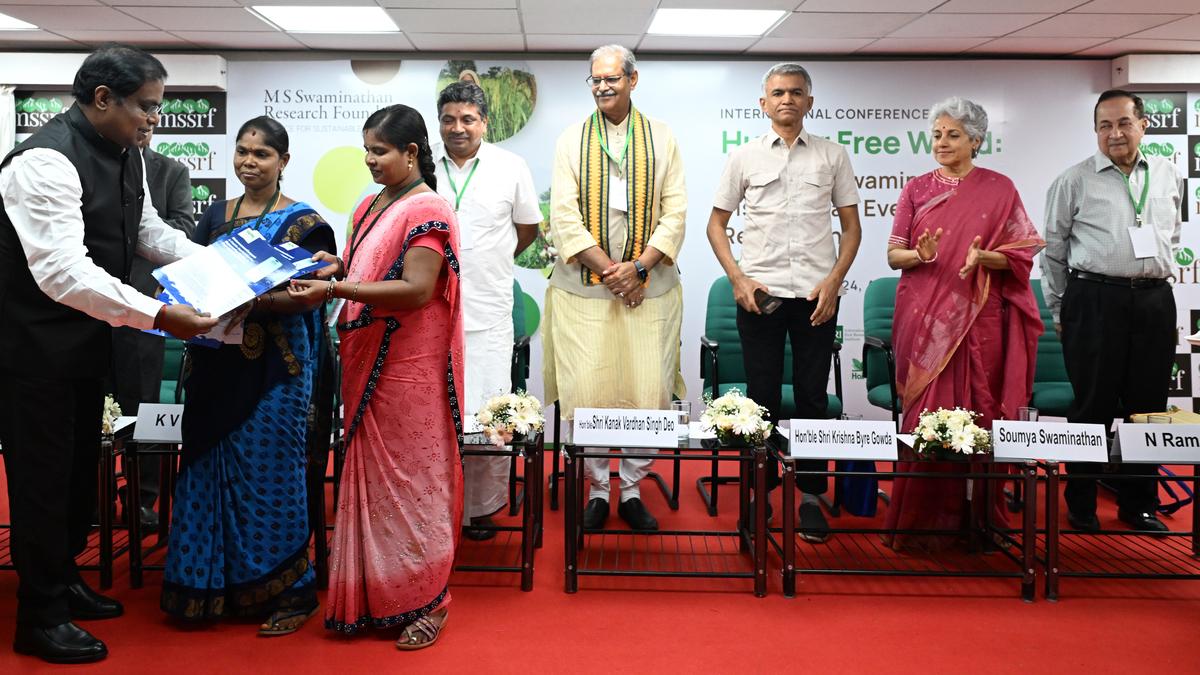
K.V.Shaji, Chairman, National Bank for Agricultural and Rural Development, launching Fisher Women Connect App at a conference at M.S. Swaminathan Research Foundation, in Chennai on Wednesday. | Photo Credit: JOTHI RAMALINGAM B
Environmental sustainability and keeping farmers’ welfare in centrality are the core of M.S. Swaminathan’s vision for evergreen revolution, said Krishna Byre Gowda, Minister for Revenue, Government of Karnataka, in Chennai on Wednesday.
Speaking at the inauguration of the ‘International Conference on Hunger Free World: Professor M.S. Swaminathan’s Vision for an Evergreen Revolution’ at M.S. Swaminathan Research Foundation (MSSRF) in Chennai, Mr. Gowda said: “I draw two pointers for the future from his emphasis on evergreen revolution. One is environmental sustainability with climate change and the challenges it poses to the agriculture systems. Another theme that Professor Swaminathan forced us to take cognizance of was the issue of farmers’ welfare. Now, we have made enormous scientific progress. Our production systems and productivity have improved. But when it comes to farmers’ welfare, I am not sure we are in a great spot. The distress amongst the farming communities continues to pose challenges for which we don’t seem to have meaningful answers. But Professor Swaminathan forced us to acknowledge this challenge, and he said farmers’ welfare has to be the centrality of the agricultural approach.”
Calling Swaminathan an unparalleled visionary, Palanivel Thiaga Rajan, Minister for Information Technology and Digital Services, Government of Tamil Nadu, said, “We are losing three to four million people out of the agricultural sector through mechanisation, automation, and transformation. We have not necessarily been able to find good employment for them. The migration to cities is rapid in places like Tamil Nadu and this is leading to greater inequality as well. The notion of perpetual improvement, yet keeping in mind the goal of pro-poor, pro-women and pro-nature is as precise and pointed as well as a comprehensive approach.”
Speaking about how the backward districts of Odisha were transformed into one of the important agricultural regions in the country, Kanak Vardhan Singh Deo, Deputy Chief Minister and Minister for Agriculture and Farmers’ Empowerment, Government of Odisha, recalled Swaminathan’s work in his State. He also listed various schemes implemented by the Centre and the Odisha government and expressed confidence that the deliberations of this conference would help India move forward in eradicating hunger.
Speaking at the event, N. Ram, Director, The Hindu Group Publishing Private Limited, recollected his several decade-long association with Swaminathan. “If you were to look for four or five great Indians in Independent India, Professor M.S. Swaminathan would definitely be high up on that list. He made a huge difference to the lives of millions of people,” said Mr. Ram, who also pointed out that successive governments that came to power in the Centre failed to implement the Swaminathan Commission’s recommendation of Minimum Support Price for farmers at a comprehensive cost of production (C2) plus 50%.
K.V. Shaji, Chairman, National Bank For Agriculture And Rural Development (NABARD), said fisheries was one sector where many women were engaged and also had a lot of potential for employment. India being the fastest growing economy, increasing the participation of women in the labour force was the need of the hour. He also said NABARD started digitising around one lakh cooperatives in the country to help around 13 crore farmers. In Tamil Nadu around 4,500 cooperatives would be computerised shortly. He also lauded the efforts and initiatives of MSSRF in transforming the lives of coastal communities and farmers.
Recollecting memories of her father, Soumya Swaminathan, Chairperson, MSSRF, said Swaminathan’s vision of an evergreen revolution implied enhancement of productivity in perpetuity without associated ecological harm. She said her father was very committed to farmers’ welfare and their happiness.
“He always believed that the vision for agriculture should be to spread happiness. He used the word bio-happiness through the conversion of our bio-resources into wealth that’s meaningful to our tribal and rural families,” she said.
Listing out various initiatives taken by MSSRF since its inception in 1988, she said the idea was to develop and demonstrate models of sustainable development. not just policies, but always from a pro-poor, pro-nature and pro-women perspective.
As a part of the conference, a new logo of MSSRF, a Fisher Women Connect App developed in partnership with Reliance Foundation, and a Geo-AI Blue Carbon Programme in association with Microsoft and the Samposhan project in Odisha were launched. Mr. Thiaga Rajan also inaugurated an exhibition of farmer producer organisations.


